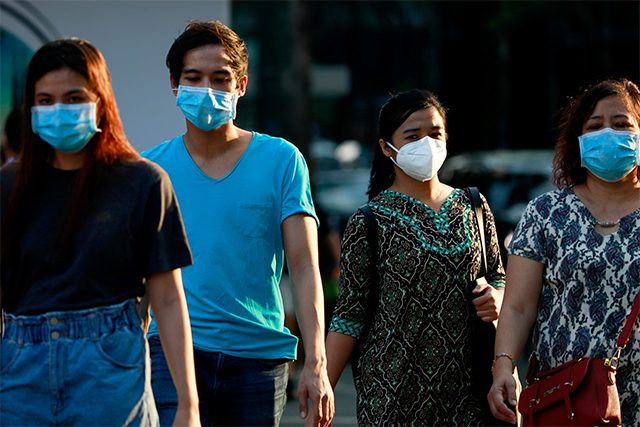
One year ago on this day, the coronavirus disease outbreak was officially declared a “pandemic” by the World Health Organization.
Filipinos recounted their experiences and early memories of the public health crisis which they initially thought would end by last year.
At 12:26 a.m. of March 12, 2020, WHO in its media briefing announced that COVID-19 “can be characterized as a pandemic.”
At that time, there were 118,000 cases reported globally in 114 countries.
More than 90% of cases were recorded in four countries, including China, where the virus started spreading, and South Korea, where more than 200,000 individuals had tested positive for the virus.
“We have never before seen a pandemic sparked by a coronavirus,” WHO director-general Dr. Tedros Adhanom Ghebreyesus said before.
He added that they are deeply alarmed not only by the sudden spread and severity of the disease, but by the “alarming levels of inaction” to contain it.
A WHO bulletin defines pandemic as “an epidemic occurring worldwide, or over a very wide area, crossing international boundaries and usually affecting a large number of people.”
An epidemic, meanwhile, is defined by the United States’ Centers for Disease Control and Prevention as an unexpected increase in the number of disease cases in a specific geographical area.
The WHO declared the COVID-19 outbreak as a public health emergency of international concern in January 2020. At that time, other countries apart from China have already been affected.
RELATED: WHO declared the COVID-19 a pandemic but what does it mean?
A month before that, the WHO China Country Office received reports of pneumonia with an unknown cause spreading in the city of Wuhan in Hubei Province.
#FlashbackFriday
As the pandemic marks its one year anniversary, some Filipinos recounted the early days of the COVID-19 outbreak in the country when it was first classified as a pandemic.
“It’ll be interesting telling this story to the kids several years/decades later because the intense paranoia and panic during the early stages was something else. The long queues in supermarkets and the hoarding. Expensive misting drones,” a Reddit user commented.
“2 months lang ata ako sa Makati during that time. Barangay din naman kasi, may mga gates at some points. Nakakalabas lang ako dun for groceries. Other than that, e bahay. I thought sa April 14 lang ‘yun. Then it was extended. Then extended…” another online user wrote.
“When that announcement came, booked the earliest flight the following day to fly out of Manila. I requested for work from home arrangement for a month and used all of my leaves. ‘Di na ulit ako nakabalik ng Manila,” a different Filipino recounted.
“I’ll never forget that day (when) we last stepped inside our classroom. I miss going out now…” another Reddit user shared.
RELATED: Memories of #WalangPasok: Students recall last moments of pre-pandemic week-long class suspension
Some online users greeted each other “Happy Anniversary” as they remember the COVID-19 pandemic declaration.
“Happy anniversary to me thinking ‘what if the pandemic lasts more than three weeks?????” a Twitter user said.
Gang Badoy of RockEd Philippines also greeted the Philippines and asked in jest, “sino’ng nananampal ngayon?”
So, sino'ng nanampal ngayon?
Happy Anniv, Philippines. 🇵🇭-Coronavirus 🦠
— Gang Capati 🇵🇭 (@gangbadoy) March 12, 2021
While not naming anyone, President Rodrigo Duterte in early 2020 said he will slap the virus, which is clearly invisible to the naked eye and minuscule in nature.
“P—inang idioto na corona ito. Hinahanap ko gusto ko sampalin ang g*go,” Duterte said before local government executives in Pasay on Feb. 10, 2020.
READ: From virus slapping to staying united: Duterte’s change of tone in addressing COVID-19
A year after
Fast forward to this year, cases are beginning to see a surge again after two new variants of COVID-19, with origins from South Africa and the United Kingdom, were detected in the country.
Different cities in the metro are also seeing a repeat of last year’s strict lockdown measures to restrict movement and mitigate virus transmission.
Experts from OCTA Research reported that the National Capital Region saw a 42% increase of additional COVID-19 cases based on the daily tally.
Its reproduction rate, which refers to the number of individuals that a COVID-19 positive can infect, also increased as well.
Data analyst Edson Guido said that the NCR has been reporting 1,000 new cases daily for one whole week as of March 10.
Last Tuesday, the total caseload of the country breached 600,000.
The country has started rolling out COVID-19 vaccines to medical frontliners this month, courtesy of China’s Sinovac and Britain’s AstraZeneca.









